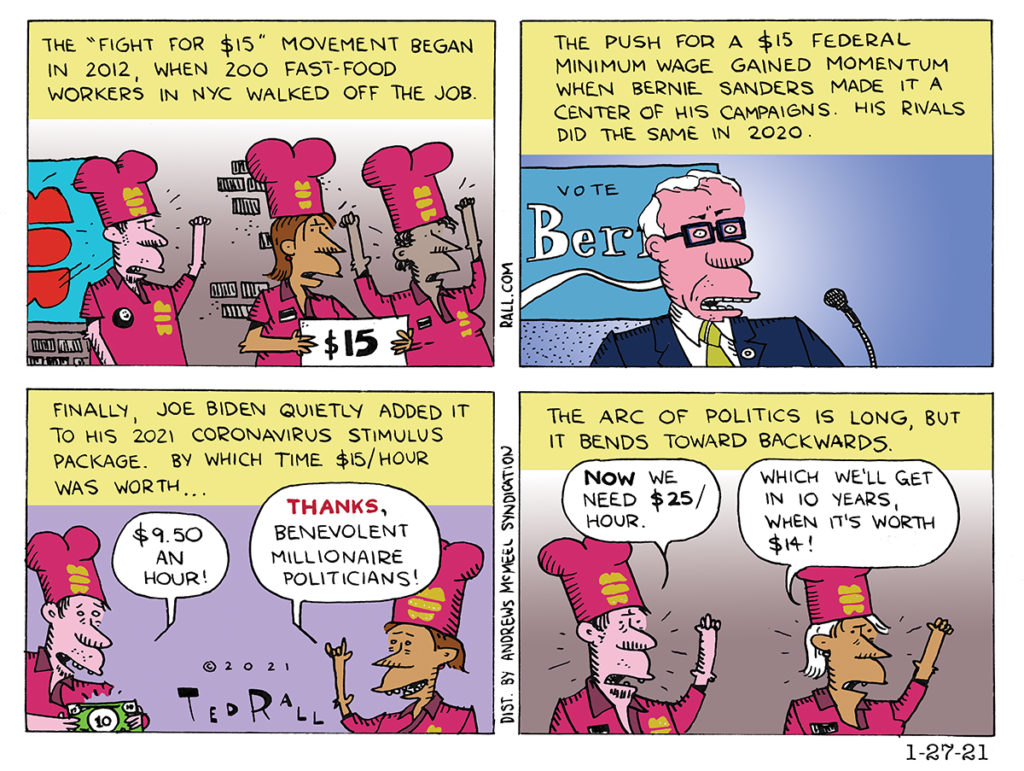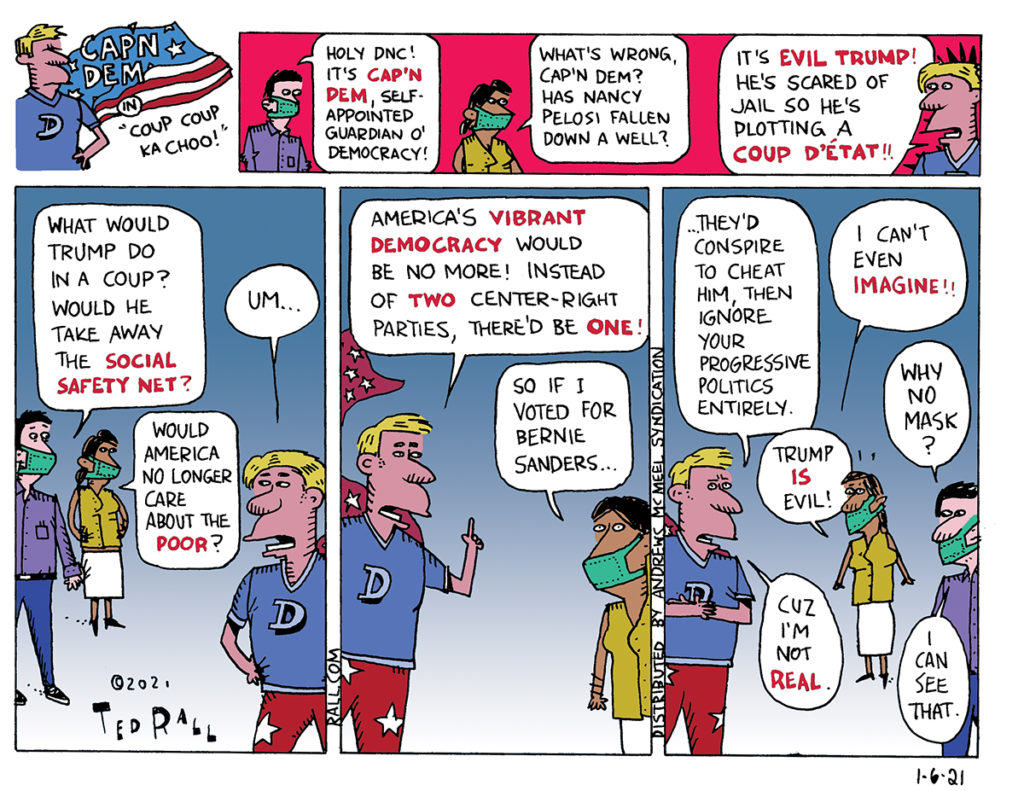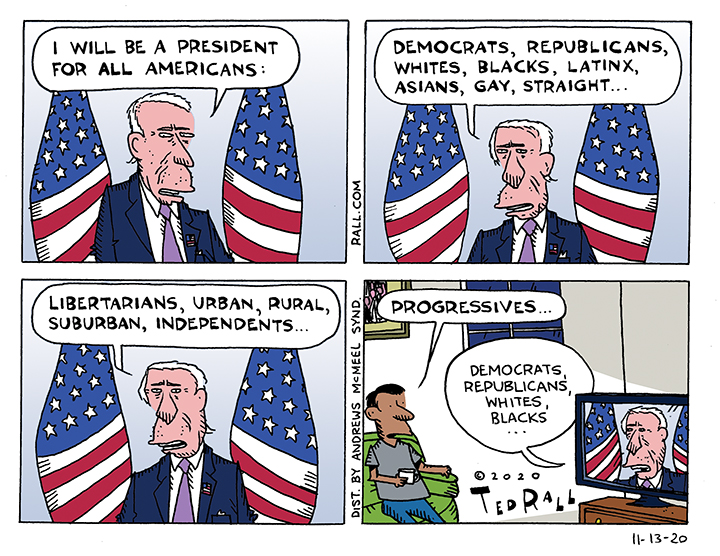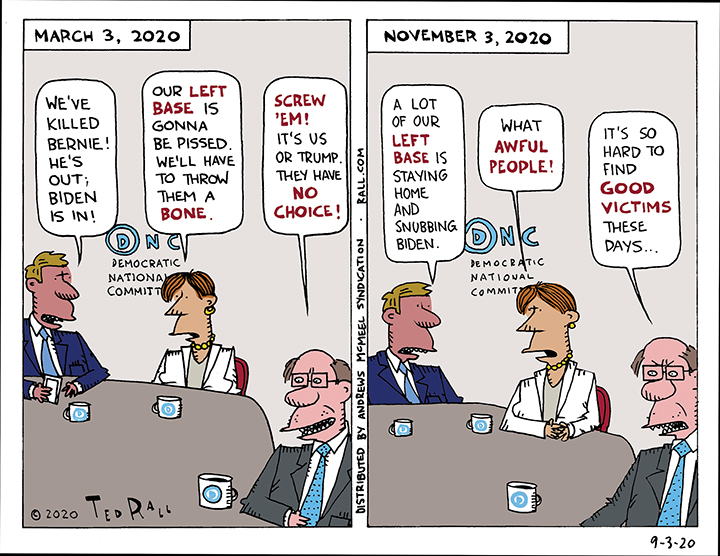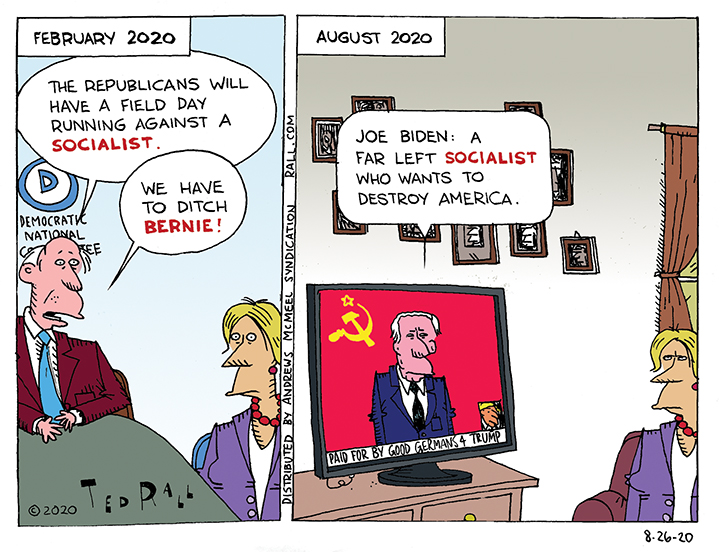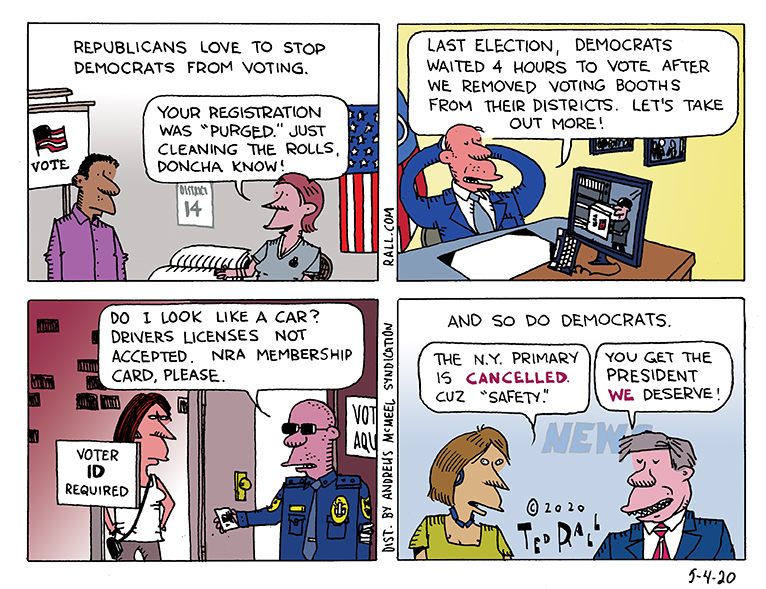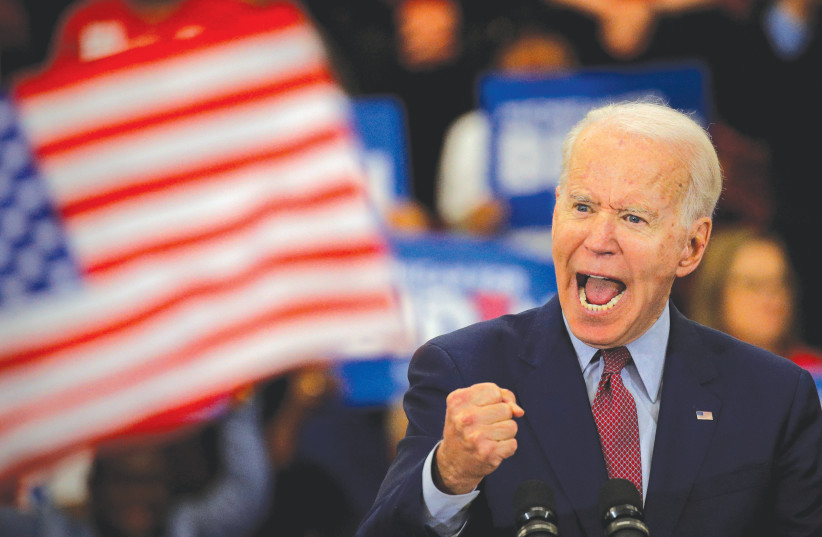It’s taken nine years for the struggle for a $15 an hour federal minimum wage to finally reach the corridors of presidential power. Now, of course, we need $25.
Why Are Our Victims so Uncooperative?
On Super Tuesday, the Democratic National Committee and President Obama carefully coordinated the replacement of Bernie Sanders by Joe Biden as the Democratic frontrunner for president. The new progressives would be upset but didn’t care because they figured progressives would have to vote for Biden no matter what. Now that that’s not the case, they are upset that their plan is not working.
Good Thing the Nominee Isn’t a Socialist
Earlier this year when Bernie Sanders was in the lead for the Democratic presidential nomination, his centrist opponents said that he would be a bad standardbearer because the Republicans would call him a socialist. Now Joe Biden, anything but a socialist, is being targeted just the same way as though he had been Bernie Sanders.
Joe Biden’s Vice Presidential Pick is…ZZZZZ
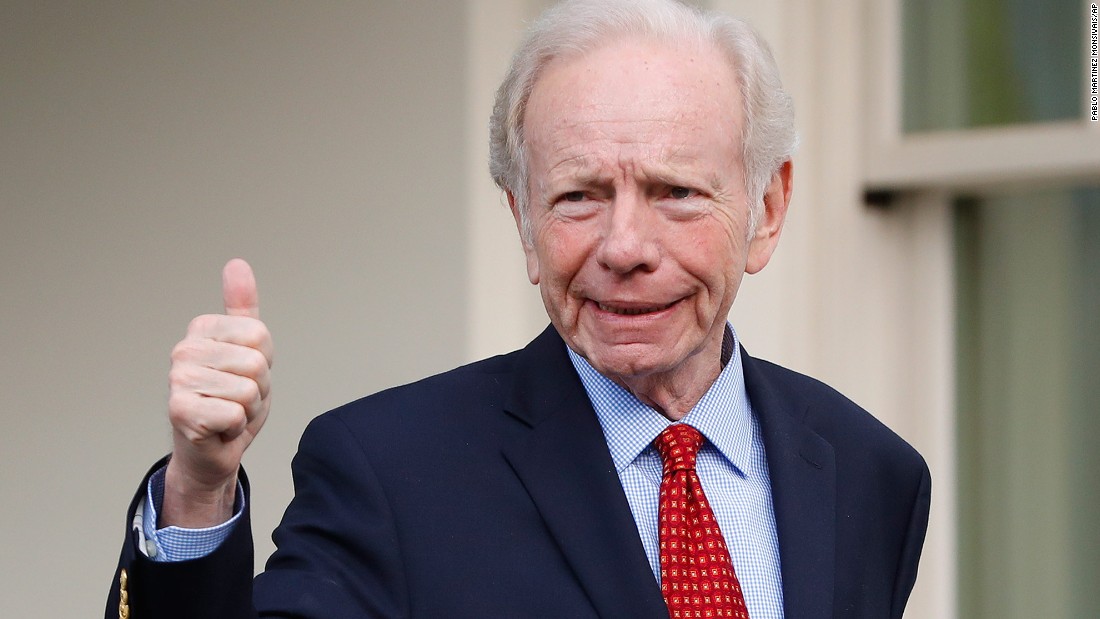
Added 6 pm Eastern 8/11/20: Well, that turned out to be true.
Most years, the Super Bowl is a dud. Yet the hype machine keeps pulling in new suckers.
The quadrennial announcement of the Democratic nomination for vice president features an identical Lucy, Charlie Brown and the football dynamic: lots of hype followed by deadly disappointment. And there’s never been more hype than this year.
Not that Joe Biden’s pick isn’t important. If he wins, he will be the oldest person to take the oath of office by a full eight years. (He’ll be 78. Trump, the second oldest, was 70 in 2017.) Even by the standards that the 70s are the new 60s, Joe Biden’s 70s look more like 80s or 90s. His choice has to satisfy several competing constituencies: women, Blacks, and the progressive voters he desperately needs to show up November 3rd instead of sitting on their hands as they did last time.
But past performance almost always being a reliable indicator of near-future returns, Democrats should prepare for a Super Bowl-like fiesta of deep disappointment.
Last cycle’s brutal primaries prompted speculation that Hillary Clinton might unify the party by giving Bernie Sanders the VP nod. She chose Tim Kaine. (Political pundits jammed phone and text messaging with: “who?”) She told Charlie Rose she loved that Kaine described himself as “too boring.”
Clinton thought Kaine’s dullness would provide balance. Voters considered it redundant. “‘Safe,’” observed Politico, “seems to be Kaine’s middle name.” In the year of Trump, safe was anything but.
That’s often the case.
I was traveling through Central Asia when a hotel employee informed me that Al Gore had announced that Connecticut senator Joe Lieberman would be his running mate to go up against Bush-Cheney in 2000. I assumed my Uzbek host was part of some weird post-Soviet gaslighting campaign. How could Gore do anything so stupid?
The mists of time and the Florida recount fiasco have blurred the fact that, like Clinton 16 years later, Gore needed a progressive to balance his record as a Third Way centrist. Inexplicably, both at the time and today, clueless Democratic pollsters somehow convinced themselves that what he really needed to do was distance himself from Bill Clinton—the president under whom he’d served for eight years and who was enjoying improving poll numbers. They also thought the conservative Lieberman’s “moral rectitude” in being the first Democrat to condemn Bill Clinton for the Monica Lewinsky scandal would appeal to left-leaning Ralph Nader voters.
Lieberman opposed affirmative action and gay marriage. He supported every major military intervention, including, at first, Vietnam.
Nader kept his progressive votes.
The first rule of picking a veep is do no harm. The second is to remember the lesson of Bill Clinton/Al Gore 1992, when Democrats won with a pair of centrists of similar age and temperament from neighboring states: geographical ticket balancing as an art peaked out when JFK tapped LBJ.
As tensions mount between voters dominated by the populist progressive left and party leaders who manipulate the Democrats’ primary process to favor corporate centrists like Obama, Clinton and Biden, however, the case for ideological balance seems stronger than ever. Surely Hillary Clinton must wake up in the middle of the night wondering if relegating Bernie Sanders to number 39 on her list of running mates was the best decision she ever made.
By that standard Elizabeth Warren ought to be keeping her phone by the window in her house with the best reception. She would be an interesting choice: both more intelligent and intellectual than her boss, white (OK, white and Native American) in the year of Black Lives Matter, someone disgruntled progressives would have a hard time justifying as the target of a voter boycott.
Of the women floating around on Biden’s supposed short list, Warren would surprise. She would exceed expectations. She might unify the party.
I don’t think she stands much of a chance.
Boring usually gets the nod.
(Ted Rall (Twitter: @tedrall), the political cartoonist, columnist and graphic novelist, is the author of the biography “Political Suicide: The Fight for the Soul of the Democratic Party.” You can support Ted’s hard-hitting political cartoons and columns and see his work first by sponsoring his work on Patreon.)
Bernie: Revised Edition
Publication Date: April 9, 2020
The only graphic novel-style biography of the Presidential Contender who revitalized the Left within the Democratic Party. National Bestseller updated for 2020 with 24 new pages taking Bernie into the 2020 election.
Ted Rall’s Bernie explores the personal and political development of a man who burst onto the national stage in 2015—rallying Americans and shaking up the Democratic Party—after decades in Congress. He’s leading the polls, but win or lose the Democratic nomination for 2020, he’s setting a new benchmark for a revived progressivism within a party that has rejected it for half a century. Insightful, funny, and accessible, this biography-in-graphic-novel-form of the presidential candidate explains both his early life and political rise, but also shows the broader history (and decline) of progressive democratic values in the U.S. until Bernie brought them back to the forefront of the political conversation.
Current Events/Biography, 2020
Seven Stories Press Paperback, 5″x7″, 192 pp., $16.95
Click here to Order Online.
Progressives Decide: Dignity and Freedom, or Voting for Biden
Bernie Sanders is out of the race and with him goes the last chance for progressivism to take over the Democratic Party for a generation.
Now his supporters will decide what to do. Intransigent #BernieOrBusters will cast about for a third-party vote, write-in Bernie or sit out the election in November. Other left-leaning voters will hope against hope that Joe Biden will either pivot to the left himself or that Biden will appoint progressive-minded cabinet members, and maybe tap Elizabeth Warren as vice president, to run the country as he continues to fade into the dying of the light.
There is absolutely no reason to think that Joe Biden would appoint a single progressive to his cabinet or pick one as his vice president. Theoretically, of course, anything is possible. Biden could take up hang-gliding! But Biden hasn’t made the slightest hint that he would pick a progressive for any important position.
Biden has said that he would consider a Republican as his vice president. He has promised to choose a woman. He sends signals when he wants to. And none of those signals has ever been directed toward the left wing of the Democratic Party.
After he consolidated his delegate lead on Super Tuesday, Biden received a lot of media coverage for “reaching out” to Sanders’ supporters. But his message was worthless pabulum: “Let me say, especially to the young voters who have been inspired by Senator Sanders: I hear you. I know what is at stake. And I know what we have to do.”
What exactly does Biden “know” he has to “do”? Nothing that progressives want. Bernie Sanders voters care about issues: Medicare For All, student loan forgiveness, free college tuition. Three days after his “olive branch,” Biden said he would veto Medicare For All if it somehow crossed his desk as president.
In the middle of the COVID-19 pandemic, that’s some malarkey.
Yet many liberal voters are praying that Biden will do something to make himself palatable enough to allow them to vote for him against Donald Trump this fall. Like the victim of an abusive alcoholic parent or spouse, they will wallow in magical thinking and project good intentions upon a candidate who has given them no reason to think he has changed. Maybe dad isn’t drunk tonight. Maybe Biden is secretly liberal.
Victims of abusive relationships “don’t stay for the pain,” psychologist Craig Malkin observed in 2013. “Their desperate, often palpable hope, if you sit in the room with them, is that the abuse will go away. And they tend to block out all evidence to the contrary.”
Given the history of the last four or five decades, it’s hard to describe the relationship between progressive voters and the corporate leadership of the Democratic Party as anything better than abusive. From Jimmy Carter to Bill Clinton and Barack Obama, progressives have been expected to donate money and cast votes for candidates who repeatedly broke their promises to fight for the poor and working class and, as time passed, felt so confident that they could get away with acting like jerks that they didn’t even have to bother to promise anything at all beyond not being Republicans—even though often they voted along with the GOP and signed their ideas into law.
2016 marked the first time that progressives stood up for themselves and demanded a place at the table, in the form of Bernie Sanders. Like any typical abuser, the DNC got angry at their victims, blaming progressives when their decision to cheat Sanders out of the nomination in favor of Hillary Clinton caused a catastrophic defeat to Donald Trump. Now it has happened again.
Though pathetic, it is not surprising to see progressives playing the role of the naïve victim who prays for his abuser to come to his senses and make nice.
With Joe Biden, there’s even more reason than usual to believe that nothing good can come out of standing by him. The man he served as vice president, Barack Obama, elevated the use and abuse of Democratic progressives to a diabolical art. He ran on Hope and Change and ending the Iraq war, only to prolong Iraq and expand Afghanistan with the backing of a cabinet that didn’t include a single progressive, not even a token like Clinton Administration labor secretary Robert Reich. Obama’s signature achievement, the Affordable Care Act, was conceived of by the right-wing Heritage foundation.
If you’re figuring out whether to stay with the Democratic Party or quit them, there’s a simple way to decide: watch Biden. If he’s serious about picking a progressive as vice president or putting some of them into his cabinet, he will be willing to name names and do so soon. His silence on this topic—which is likely—probably means Vice President Kamala Harris or Amy Klobuchar and a bunch of Goldman Sachs wankers managing the economic crisis again.
Don’t be surprised if a lot of Democrats who have been let down by “their” party vote for it again this November. Abuse survivors “suffer from post-traumatic stress syndrome, one symptom of which is dissociation, which often creates such profound detachment from the reality of the abuse that sufferers scarcely remember being hurt at all,” Dr. Malkin wrote. “Dissociating victims can’t leave the abuse because they aren’t psychologically present enough to recall the pain of what happened.”
(Ted Rall (Twitter: @tedrall), the political cartoonist, columnist and graphic novelist, is the author of the biography “Bernie.” You can support Ted’s hard-hitting political cartoons and columns and see his work first by sponsoring his work on Patreon.)
Why We Need a New Progressive Party and How We Can Create It

There is no room for progressives in the Democratic Party.
No matter how many votes he or she gets, no progressive will be permitted to be the presidential nominee of the Democratic Party.
Progressives who try to work inside of, contribute to and support the Democratic Party have no real chance of moving its candidates or policies to the left.
Remaining inside the Democratic Party achieves nothing; to the contrary, it is insidiously counterproductive. Working for “change from the inside” strengthens centrist politicians who oppose progressivism with every fiber of their being.
If American electoral democracy has a future, and progressives want to be part of that future, there is only one way forward: create and build a new party in which progressivism isn’t merely tolerated or partly accommodated as some fringe or necessary nuisance but is its core mission.
We need a New Progressive Party.
The reason is simple: progressivism and corporate centrism are not parts of an ideological spectrum. Centrism isn’t watered-down progressivism; centrism directly opposes progressivism. Centrists want wars and don’t care about the poor; progressives want no wars and care deeply about the poor. There is no room for compromise between the two.
A New Progressive Party will go nowhere if, like the Green Party, it is poorly funded and disorganized and unable to field a slate of candidates across the board, from city council to state representative to congress. It must begin robustly, it must grow quickly, and it must be the only viable outlet for real progressives. Go big or go home.
This could be done. Now is the perfect time.
Keep reading. I’ll explain how.
Anyone who believes progressives have a place inside the Democratic Party should reflect on the experience of Bernie Sanders. (Those with an interest in recent history can delve into the dispiriting experiences of others who have tried to move the party left from the inside like Ted Kennedy, Jesse Jackson and Howard Dean, only to be ignored, snubbed and cheated.)
In both 2016 and 2020 Democratic-aligned media companies marginalized, misrepresented and deprived Sanders of coverage proportionate to his level of support in the polls. In 2016 the Democratic National Committee literally sold itself to Hillary Clinton’s center-right campaign apparatus, which conspired with the DNC to short Sanders on vote counts and deprive him of access to party data. In 2020 the DNC appears to have derailed Sanders’ frontrunner status by arranging for candidates Pete Buttigieg, Beto O’Rourke, Amy Klobuchar and others to drop out and endorse the Joe Biden one day before the key Super Tuesday primaries.
This is not one of those “better luck next time” scenarios. Sanders is too old to run again. AOC and her fellow progressive Squad are too young to mount a serious challenge to the DNC moderate hierarchy any time soon. Progressivism inside the Democratic Party is unlikely to again surge to Bernie levels for at least a decade.
Progressivism in general remains vibrant. Bernie Sanders has 31% of the 2020 primary popular vote. Elizabeth Warren, who has withdrawn, has 10%. Even if we assume that other former candidates like Pete Buttigieg didn’t get a single progressive vote — which isn’t likely — at least 41% of Democratic primary voters currently support progressivism. That makes about 20% of the electorate overall. Roughly 20% of non-voters, or about 9% of the total electorate, are progressive.
A New Progressive Party should therefore be able to count on roughly one of five voters out of the gate, with short-term potential of 30%. Not bad in a three-party system.
Now consider two factors that point to growth. As even corporate media concedes, progressive ideas like socialized medicine and a guaranteed living wage have suddenly exploded in popularity due to the coronavirus crisis and resulting economic freefall. Given the grim projections for the economy during the foreseeable future, 20-to-30% looks more like a floor than a ceiling.
There is greater potential of building a party from the grassroots than from the top down. Even while the presidency remains elusive, local politics are quirkier and thus offer opportunity for growth. Sanders began as mayor of Burlington; AOC won a surprise challenge to a long-time incumbent Democratic congressman in Queens. A Progressive farm team could and would spring up quickly in left-leaning college towns like Madison and Charlottesville.
But how? The D-R duopoly has rigged the system in its favor. Ballot access is tough. They control the presidential debates and coverage by the news media.
As I wrote above, funding is crucial. The fact that Bernie Sanders raised over $100 million so far in 2020 from small donors proves that progressives can raise cash for a cause they care about. So how do you start this new party?
The first step is to convene a founding meeting in a big venue like McCormick Place Convention Center. (Chicago is easy to get to from everywhere in the U.S.) Launch a Kickstarter to cover the cost of renting the hall; unless there are enough pledges to cover the total, no one has to pay up and the attempt is over. It serves as the first test of whether enough progressives are ready to break away from the Democratic Party.
The agenda of the first convention of the New Progressive Party will be dedicated to debating and agreeing to a platform, electing party officials and setting a strategy for the next election.
The newly-elected officials of the party then fan across the nation and start building local organizations in their own communities to recruit, fund and campaign for candidates to local and state office. Like the Democrats and Republicans, every four years there will be a national primary and convention to present a candidate for the presidency.
Some will argue that the creation of a party just for progressives will split the left. That assumes that the Democratic Party represents the left. The truth is exactly the opposite: the Democratic Party is where the American left goes to die. If the left wants to live, it must fight and struggle for the things that it cares about on its own, in its own home.
(Ted Rall (Twitter: @tedrall), the political cartoonist, columnist and graphic novelist, is the author of the biography “Bernie.” You can support Ted’s hard-hitting political cartoons and columns and see his work first by sponsoring his work on Patreon.)

